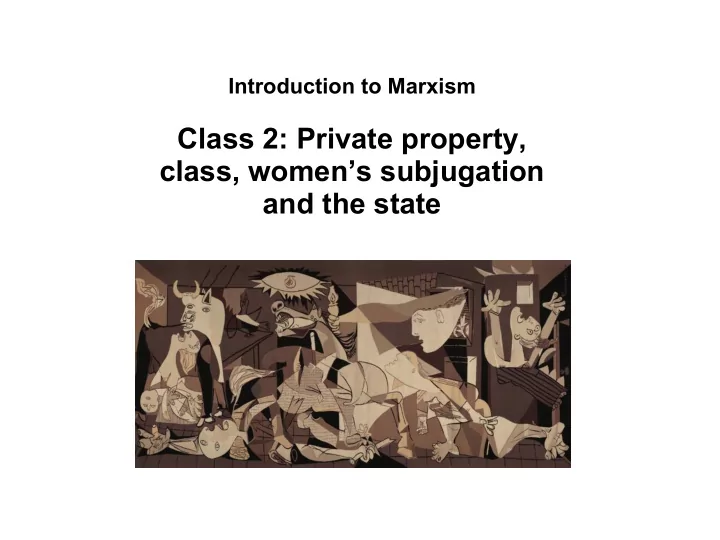

Introduction to Marxism Class 2: Private property, class, women’s subjugation and the state
Class divided Communal
Contradictions in early neolithic societies ● Early agriculture was hard work – more labour needed, women's reproductive power exploited more ● Competition for land and water leads to conflict between groups of farming communities and with hunter-gatherer communities ● Slaves acquired as by- Neolithic figurines often of women product of war pregnant or giving birth. Fertility goddesses prominent
Changes in role and status of women Women had equal status but separate roles, clans often matrilineal, Hunter-gatherer society women had fewer children Need for labour means women under pressure to reproduce more, clans Early farming society begin to shift to patrilineal Need for labour and land leads to first wars, slaves. Social surplus allows for Later farming society new divisions of labour and the emergence of class
Development of private property Competition between groups for land, water and labour excludes No concept of property some groups from access to these. Greater alienation from nature. 'We don't own the land, the land owns us' Communal property Communal property is first informally privatised then laws are created to justify and enforce Private property new private property rights
The state in Greek antiquity (slavery mode of production) Law, religion, family, culture Superstructure The base Means of production, relations of production
The feudal state Law, religion, family, culture Superstructure The base Means of production, relations of production
The capitalist state Law, religion, family, culture Superstructure The base Means of production, relations of production
Can the state be abolished? “The state, therefore, has not existed from all eternity. There have been societies which have managed without it, which had no notion of the state or state power. At a definite stage of economic development, which necessarily involved the cleavage of society into classes, the state became a necessity because of this cleavage. We are now rapidly approaching a stage in the development of production at which the existence of these classes has not only ceased to be a necessity, but becomes a positive hindrance to production. They will fall as inevitably as they once arose. The state inevitably falls with them. The society which organises production anew on the basis of free and equal association of the producers will put the whole state machinery where it will then belong — into the museum of antiquities, next to the spinning wheel and the bronze axe.” Engels, Origins of the Family, Private Property, and the State ● Eliminate class divisions to eliminate the state Will a privileged class gives up its privileges without a fight? ● Is there such a thing as a democratic state? ● Is there such a thing as a people's state?
Recommend
More recommend